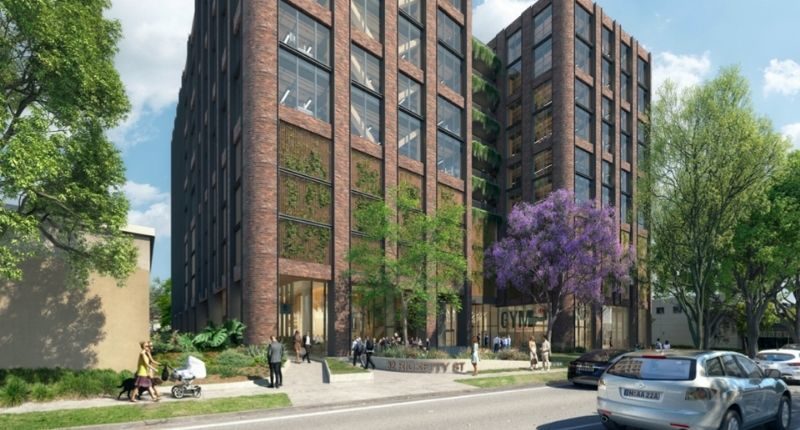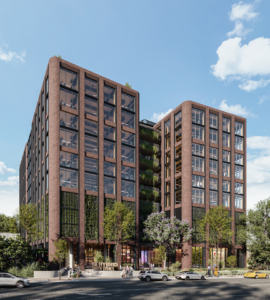
- Development will slash its upfront embodied carbon by 40% in line with Paris Climate Agreement
- Amenities include EV and bicycle chargers, half basketball court and fitness studio
- Innovative design expected to draw tenants from a variety of creative industries
A unique and sustainable commercial tower, aptly named The Hybrid, is set to undergo development in South Sydney with completion scheduled for 2023.
The A-grade tower, set to be built at 12 Ossary Street in Mascot, will span 16,000sqm across 10 levels.
Going green for the future
The project is the first in Australia by real estate developer LinkCity, the development branch of Paris-based firm and sustainability leader Bouygues Construction.
Bouygues Construction, as required by the Paris Climate Agreement, ensures all of its projects reduces its greenhouse gas emissions by at least 30%.
In true Bouygues style, The Hybrid will feature a distinctive hybrid timber structural frame and make its mark as one of Australia’s most sustainable buildings.
Nicolas Swiderski, Australian General Manager of LinkCity, said the development is all about designing differently and pushing the boundaries.
“We have worked closely with our sister company A W Edwards who will build this flagship building, to come up with a smart structure that was fast to build, substantially decreased the carbon footprint of the building, and was better for tenants.”
Nicolas Swiderski, LinkCity
The hybrid structure of the development will allow the upfront embodied carbon of the building to be reduced by 40%.
Alongside slashing carbon emissions, LinkCity has also pledged to deliver a 6 Star Greenstar rating and a 5.5 NABERS rating.
Sustainable and unique amenities
The tower is undoubtedly an innovative and fresh take on the traditional office space, offering a range of unparalleled amenities.
Knight Frank agent Nick Sinclair said the building would suit a business that wants to make a statement about their commitment to sustainability and employee wellbeing.
To align with its sustainable focus, The Hybrid will have 5% electric vehicle charging capability, with opportunity to grow to 100% and facilitate 245 cars.

A 99kw solar installation, a green roof and four beehives will sit atop the roof, reducing the energy consumption of the building and benefitting biodiversity.
Tenants will also enjoy a 200sqm courtyard on the fourth level, an active rooftop and open terrace with stunning city views, and a half basketball court.
In an effort to encourage healthier habits and greener lifestyles, electric bicycle charging stations along with 142 bike spaces will adjoin a fitness studio.
“Recycled bricks, quarterly honey deliveries to the tenants from the rooftop hives, beautiful timber columns on the office floor and green laneway are certainly not things you associate with a lot of brand new offices in this area,” said Mr Sinclair.
Clever design attracts new tenants to Mascot
The Mascot area, home to the Sydney airport, has roots as an industrial area but has more recently evolved into a hotspot for high-density residential dwellings.
Thomas Hansen, Scott Carver architects project lead, said the design focus was to create a building that was authentic to the South Sydney area and drew on the area’s industrial heritage.
“This was achieved with The Hybrid where the architecture is revealed in three key layers: a HShaped built form designed to maximise flexibility and daylight, a unique façade comprising a hierarchy of recycled brick, steel and glass, and the showcasing of the hybrid timber structure, putting construction innovation on display,” said Mr Hansen.
“The recycled brick, vertical and horizontal proportions and timber internals could see this building blend in alongside Surry Hills’ finest heritage examples.”
Thomas Hansen, Scott Carver
Mr Sinclair added that the development will draw in a new type of tenant, appealing to those in creative, media and fashion industries.
“Usually those tenants would typically be in the city fringe, but this is offering them like for like product, and in many cases at half the price of inner city markets.
“The landscape in Mascot is changing with growth in the commercial market, which is increasingly drawing in more tenants,” Mr Sinclair concluded.







